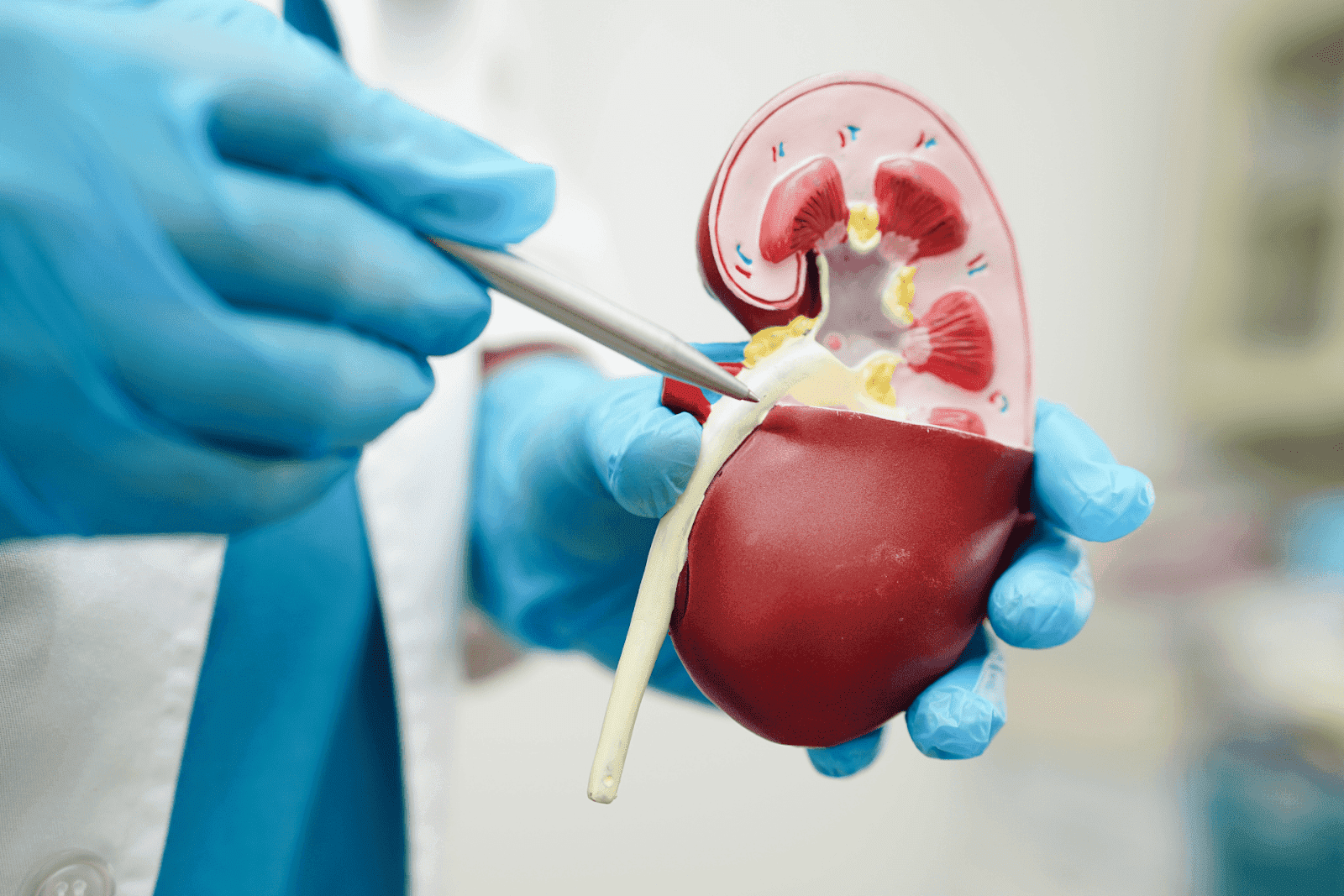What to Expect After Passing a Kidney Stone
Passing a kidney stone can be an intense and painful experience, but understanding what happens afterward can help ease anxiety and guide you toward a smoother recovery. [...]
Read More
Medically reviewed by Alan Lucks | MD, Alan Lucks MDPC Private Practice - New York on October 13th, 2025.
Pain relief occurs immediately after passage, but expect mild cramping and pink-tinged urine for 2-3 days as the urinary tract heals from stone irritation.
Drinking 8-10 glasses of water daily post-passage flushes remaining fragments and cuts recurrence risk by up to 50%, according to clinical studies.
Red flags requiring immediate medical care include fever above 101°F, persistent severe pain, difficulty urinating, or blood in urine lasting beyond 3-4 days.
Follow-up imaging within 1-2 weeks confirms complete clearance, while laboratory stone analysis determines your specific dietary restrictions for prevention.
Long-term prevention requires 2-3 liters daily fluid intake, sodium under 2,300mg, and reduced animal protein—critical since you have a 50% chance of recurrence within 10 years.
Passing a kidney stone can be an intense and painful experience, but understanding what happens afterward can help ease anxiety and guide you toward a smoother recovery. Kidney stones are hard deposits made of minerals and salts that form inside your kidneys. When they move through your urinary tract, they can cause severe discomfort. However, once the stone has passed, the journey toward healing begins.
In this article, we will explore what to expect after passing a kidney stone, including common symptoms, recovery tips, potential complications, and when to seek medical advice. Additionally, we will highlight how innovative telehealth services like Doctronic.ai can support your recovery and ongoing kidney health.
 Immediate Aftermath: What Happens Right After Passing a Kidney Stone?
Immediate Aftermath: What Happens Right After Passing a Kidney Stone?Many people experience significant relief once the kidney stone has passed, as the intense pain caused by the stone moving through the urinary tract subsides. However, it is common to feel some residual discomfort or mild cramping for a few days following the event. This is due to irritation and inflammation in the urinary tract caused by the stone’s passage. The body’s healing process may lead to sensations that can be mistaken for the original pain, but these are typically less severe and gradually diminish over time.
Additionally, you might notice changes in your urine, such as pink, red, or brown discoloration, which is usually due to blood from the irritated tissues. This should gradually improve over a few days. If bleeding persists or worsens, it is crucial to seek medical attention. During this time, staying well-hydrated is essential. Drinking plenty of water can help flush out any remaining particles and may alleviate some discomfort. Herbal teas and clear broths can also be soothing options that provide hydration while being gentle on the stomach.
After passing a kidney stone, it’s crucial to monitor your symptoms closely. Some signs to watch for include:
Persistent or worsening pain
Fever or chills, which may indicate an infection
Difficulty urinating or changes in urinary frequency
Continued blood in the urine beyond a few days
If any of these symptoms occur, contacting a healthcare professional promptly is essential. Telehealth platforms like Doctronic.ai offer convenient, affordable access to medical advice and video consultations with licensed doctors 24/7, helping you get timely care without leaving home. It’s also beneficial to keep a diary of your symptoms, noting any changes in pain levels, urinary habits, and overall health. This information can be invaluable for your healthcare provider in determining the next steps for your recovery or any further treatment needed.
Moreover, it’s important to consider lifestyle modifications that may help prevent future kidney stones. Dietary adjustments, such as reducing sodium intake and increasing the consumption of fruits and vegetables, can play a significant role. Additionally, certain supplements, like potassium citrate, may help in maintaining a healthy urinary environment, making it less conducive to stone formation. Consulting with a nutritionist or a healthcare provider can provide tailored advice based on your specific health needs and history.
One of the most important steps after passing a kidney stone is to stay well-hydrated. Drinking plenty of water helps flush out remaining stone fragments and reduces the risk of new stones forming. Aim for at least 8 to 10 glasses of water daily, or enough to produce clear or light-colored urine.
Some people find that adding lemon juice to their water can help, as citrate in lemons may inhibit stone formation. However, it’s best to discuss dietary changes with a healthcare provider to tailor recommendations to your specific situation. Additionally, incorporating other hydrating beverages such as herbal teas or coconut water can also contribute to your daily fluid intake while offering additional health benefits. For instance, herbal teas like dandelion or nettle can support kidney function and provide a soothing effect on the urinary tract.
While the worst pain usually resolves after the stone passes, mild discomfort can linger. Over-the-counter pain relievers such as ibuprofen or acetaminophen may help manage this. Resting and avoiding strenuous activities can also support healing.
If pain intensifies or does not improve within a few days, medical evaluation is necessary to rule out complications such as infection or obstruction. It’s also beneficial to engage in gentle activities like walking or stretching, which can promote circulation and aid in the recovery process. Listening to your body is crucial; if you feel fatigued, allow yourself the time to rest and recuperate fully.
After passing a kidney stone, follow-up care is important to prevent recurrence. Your doctor may recommend imaging tests such as an ultrasound or a CT scan to ensure all stone fragments have cleared. Additionally, analyzing the passed stone can provide valuable information about its composition, guiding dietary and lifestyle adjustments.
Preventative strategies may include:
Modifying your diet to reduce salt, oxalate, or animal protein intake
Maintaining a healthy weight
Taking prescribed medications if necessary
Telehealth services like Doctronic.ai make it easier to maintain regular communication with healthcare providers. Their AI-powered platform offers personalized medical advice and can remember your health history, making follow-up care more efficient and tailored to your needs. Moreover, utilizing mobile apps that track your water intake and dietary habits can serve as a helpful reminder to stay on track with your recovery and prevention strategies. These tools can empower you to take control of your health and make informed decisions that contribute to your long-term well-being.
Although most people recover well after passing a kidney stone, complications can sometimes arise. It is important to recognize warning signs that require urgent medical attention, including:
Severe pain that does not improve with medication
High fever or chills
Persistent nausea or vomiting
Inability to urinate or severe urinary retention
Signs of infection, such as foul-smelling or cloudy urine
If you experience any of these symptoms, do not delay seeking care. While Doctronic.ai does not provide urgent care location listings, their telehealth doctors are available 24/7 for video visits to assess your condition and advise on next steps, including whether in-person emergency care is needed.
Ignoring symptoms of infection or obstruction after passing a kidney stone can lead to serious health issues such as kidney damage or sepsis. Prompt diagnosis and treatment are critical to avoid these outcomes.
Preventing future kidney stones often involves making sustainable lifestyle changes. These include:
Drinking adequate fluids throughout the day
Eating a balanced diet low in excessive salt and animal protein
Limiting foods high in oxalates, such as spinach, nuts, and chocolate, if advised by your doctor
Maintaining a healthy body weight
Regular monitoring of kidney health is important, especially for individuals who have had multiple stones. Keeping track of symptoms and staying in touch with healthcare providers can help catch issues early.
Advances in healthcare technology are transforming how patients manage chronic conditions like kidney stones. Doctronic.ai stands out as an AI doctor that combines the latest peer-reviewed medical research with personalized care. It offers free AI-driven consultations and affordable telehealth video visits with licensed doctors across all 50 states.
With Doctronic.ai, patients gain unlimited access to a virtual doctor that remembers their medical history and provides tailored advice quickly. This continuous, personalized support is invaluable for managing kidney health and preventing stone recurrence.
 Steps Toward Healing After Passing a Kidney Stone
Steps Toward Healing After Passing a Kidney StonePassing a kidney stone is a challenging experience, but understanding what to expect afterward can make the recovery process less daunting. While relief often comes quickly, monitoring symptoms, staying hydrated, managing pain, and following up with healthcare providers are essential steps toward full recovery and long-term kidney health.
For convenient, expert medical support during your recovery and beyond, consider using Doctronic.ai. This innovative AI-powered telehealth service offers fast, smart, and personalized care that fits your schedule, helping you navigate kidney stone recovery with confidence.
As you navigate the path to recovery after passing a kidney stone, remember that Doctronic is here to provide you with the most advanced care at your fingertips. With over 10 million users and growing, Doctronic offers free AI doctor visits that synthesize the latest medical research to answer your health questions instantly and accurately. Our AI-powered platform is designed to be faster, innovative, and more personal, ensuring you receive care that's tailored just for you, 24/7, in all 50 states. Don't wait in line for answers; talk to an AI Doctor now, for free, and experience the most personal primary care, powered by AI.
Recovery involves immediate pain relief followed by mild symptoms for several days, with aggressive hydration being your most important tool for healing and prevention. The key is maintaining excellent fluid intake and following stone-specific dietary modifications to cut your substantial recurrence risk in half. If you're experiencing concerning symptoms during recovery, Doctronic can provide personalized guidance on when to seek immediate care.
Passing a kidney stone can be an intense and painful experience, but understanding what happens afterward can help ease anxiety and guide you toward a smoother recovery. [...]
Read More